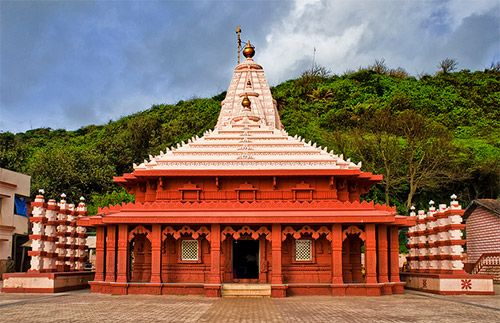

By JKV Travel
When you think of Maharashtra’s Konkan region, the first name that comes to mind is Ratnagiri, a coastal town where the blue waters of the Arabian Sea meet golden shores, lush greenery, and vibrant culture. Famous worldwide for its Alphonso mangoes, Ratnagiri is not just about fruit but about an experience that combines scenic beauty, spiritual bliss, history, and food that lingers in your memory.
This town is a treasure trove for every kind of traveler. For those who love relaxing by the sea, Ratnagiri’s beaches promise peace and postcard-worthy sunsets. For the spiritually inclined, ancient temples with unique legends await. History buffs will find stories of kings, forts, and palaces tucked away in every corner. And, of course, food lovers will be spoilt for choice with seafood, mangoes, and kokum-based delicacies.
So, let’s dive deep into this detailed Ratnagiri travel guide where every beach, temple, and local dish tells you why Ratnagiri is truly the jewel of Konkan.

Perhaps the most famous beach in Ratnagiri, Ganpatipule Beach is a destination in itself. Imagine walking on golden sands with gentle waves brushing your feet while the majestic Ganpati Temple stands tall nearby. This beach offers both spiritual charm and natural beauty, making it unique. The sunsets here are breathtaking, painting the sky in hues of orange, pink, and purple. Travelers often spend hours simply soaking in the views or enjoying boat rides along the coast.
If you want to escape the crowds, Bhatye Beach is your answer. This 1.5 km stretch of clean, soft sand is perfect for long walks, beach picnics, or simply lying down and watching the clouds drift. What makes this beach special is its tranquil environment, away from the noise of commercial spots. Coconut groves line the background, and fishermen can often be seen setting sail giving travelers a glimpse into the authentic Konkan lifestyle.
Located close to Ratnagiri town, Mandavi Beach is a lively hangout. Unlike Bhatye, this beach has a slightly more vibrant atmosphere with small stalls selling snacks like bhajjis, chaats, and coconut water. It’s an excellent place to mingle with locals, try street food, and watch children playing cricket on the sand. In the evening, the horizon lights up with fishing boats returning home, creating a beautiful scene.
Not as popular as Ganpatipule but equally mesmerizing, the Aare-Ware beaches are hidden gems. These twin beaches are surrounded by hills and forests, making them look untouched and pristine. They are ideal for travelers seeking offbeat, photography-friendly locations.

Situated right by the beach, the Ganpatipule Temple is over 400 years old and holds a special place in the hearts of devotees. Unlike most temples, here the idol of Lord Ganesha faces west, guarding the sea. The idol is believed to be self-manifested (Swayambhu), which makes the temple even more revered. During festivals like Ganesh Chaturthi, the temple is beautifully decorated, and thousands of devotees visit to seek blessings.
The massive Ratnadurga Fort, built on a hill by the sea, is home to the Bhagwati Temple inside its walls. As you climb to the fort, you get panoramic views of the Arabian Sea, fishing villages, and lush greenery. The temple within the fort is not only a place of worship but also a spiritual reminder of Ratnagiri’s maritime history and battles fought here.
The Thibaw Palace, built for the exiled Burmese King Thibaw, is surrounded by smaller temples and shrines. These temples reflect the cultural mix and stories of royalty, exile, and devotion that shaped Ratnagiri’s past.
Say the word Ratnagiri, and the first thing anyone will think of is the world-famous Alphonso mango. Known for its sweetness, fragrance, and smooth pulp, Ratnagiri’s Alphonso is often called the “Golden Jewel of Konkan.” During the season (March–June), markets overflow with baskets of fresh Alphonso mangoes. Travelers often take them back as souvenirs, but don’t miss trying aamras, mango ice creams, and mango pickles while you’re here.
Being a coastal town, Ratnagiri serves some of the best seafood in Maharashtra. Fish thalis are a must-try, often featuring pomfret, surmai (kingfish), or bangda (mackerel), served with rice, solkadhi (kokum drink), and fried fish. Don’t miss prawns and crabs cooked in spicy Malvani masala it’s a flavor explosion. Beachside shacks and homestays often serve meals cooked in authentic Konkan style, giving travelers a truly local experience.
Apart from mangoes, Ratnagiri is also known for kokum, a tangy fruit used in curries and drinks. Solkadhi, a drink made with kokum and coconut milk, is the perfect refresher after a spicy seafood meal. It’s not just tasty but also great for digestion.
Ratnadurga Fort: A sprawling seaside fort with panoramic views and a peek into Ratnagiri’s history.
Jaigad Fort & Lighthouse: A must for history buffs and photographers, offering sweeping sea views.
Thibaw Palace: A slice of history tied to the Burmese royal family.
Local Markets: Vibrant bazaars where you can shop for mangoes, kokum, cashews, and handicrafts.
Frequently Asked Questions About Ratnagiri - By JKV Travel
Ratnagiri is famous for its Alphonso mangoes, pristine Konkan beaches, historic forts, and ancient temples, making it a top travel destination in Maharashtra.
The most popular beaches are Ganpatipule Beach, Bhatye Beach, Mandavi Beach, and Aare-Ware Beaches, each offering unique experiences from spirituality to peace and adventure.
The best time is October to March for pleasant weather. For mango lovers, March to June is perfect to taste Ratnagiri Alphonso mangoes.
Ratnagiri is well-connected by train (Konkan Railway), road (NH-66 Mumbai–Goa highway), and air (nearest airport is Kolhapur and Goa).
A 2–3 day trip is enough to cover beaches, temples, forts, and local markets at a relaxed pace.
Yes, Ratnagiri is considered safe for solo travelers, families, and groups, with friendly locals and good connectivity.
Ratnagiri is not just a place it’s a coastal storybook that blends natural beauty, history, spirituality, and flavors into one unforgettable journey. Whether you’re gazing at the sunset on Ganpatipule Beach, seeking blessings at the Ganpatipule Temple, exploring forts, or indulging in mangoes and seafood, every moment here feels authentic and soulful.
For travelers who want to escape city chaos, Ratnagiri offers tranquility with a cultural twist. Visit during October to March for pleasant weather, or during mango season from March to June for a fruit-filled delight. And if you’re someone who loves offbeat experiences, Ratnagiri’s lesser-known beaches and local villages will steal your heart.
So pack your bags, head to Ratnagiri, and let this Konkan paradise surprise you at every turn with JKV Travel!
Also Read
Why Alibag is the Best Coastal Destination Near Mumbai & Pune
If you love exploring Konkan’s beaches, forts, and coastal food, Alibag is another seaside paradise just a short drive from Mumbai and Pune.